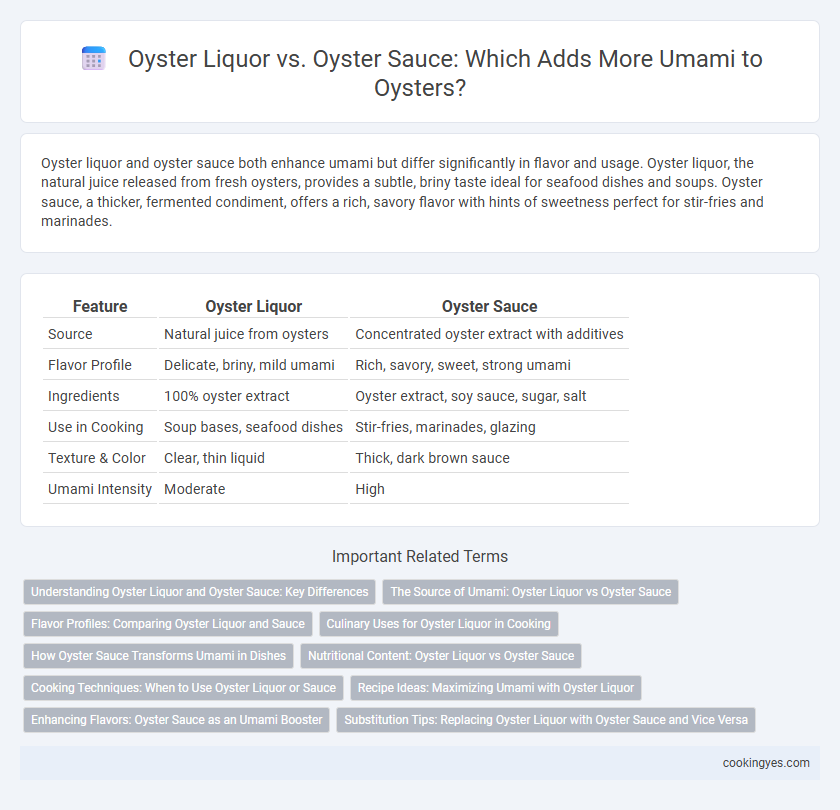Oyster liquor and oyster sauce both enhance umami but differ significantly in flavor and usage. Oyster liquor, the natural juice released from fresh oysters, provides a subtle, briny taste ideal for seafood dishes and soups. Oyster sauce, a thicker, fermented condiment, offers a rich, savory flavor with hints of sweetness perfect for stir-fries and marinades.
Table of Comparison
| Feature | Oyster Liquor | Oyster Sauce |
|---|---|---|
| Source | Natural juice from oysters | Concentrated oyster extract with additives |
| Flavor Profile | Delicate, briny, mild umami | Rich, savory, sweet, strong umami |
| Ingredients | 100% oyster extract | Oyster extract, soy sauce, sugar, salt |
| Use in Cooking | Soup bases, seafood dishes | Stir-fries, marinades, glazing |
| Texture & Color | Clear, thin liquid | Thick, dark brown sauce |
| Umami Intensity | Moderate | High |
Understanding Oyster Liquor and Oyster Sauce: Key Differences
Oyster liquor is the natural briny liquid found inside fresh oysters, rich in umami and often used to enhance seafood dishes with a subtle, oceanic flavor. Oyster sauce is a thick, savory condiment made by cooking oyster extracts with soy sauce and sugar, delivering a concentrated umami punch commonly used in Asian cuisine. Understanding these key differences helps chefs choose oyster liquor for fresh, delicate seafood enhancement and oyster sauce for robust, savory seasoning.
The Source of Umami: Oyster Liquor vs Oyster Sauce
Oyster liquor, the natural briny liquid released from fresh oysters, offers a pure and subtle umami flavor derived directly from the ocean's minerals and amino acids. In contrast, oyster sauce is a concentrated, savory condiment made by cooking down oyster extracts with soy sauce, sugar, and other ingredients, creating a richer and more complex umami profile. While oyster liquor enhances dishes with a fresh, delicate seafood essence, oyster sauce provides a robust, caramelized depth ideal for stir-fries and marinades.
Flavor Profiles: Comparing Oyster Liquor and Sauce
Oyster liquor offers a fresh, briny essence with natural oceanic sweetness that enhances umami subtly, while oyster sauce provides a rich, concentrated depth with caramelized, savory notes due to its fermentation process. The umami intensity in oyster sauce is more pronounced, making it ideal for robust flavoring in stir-fries and marinades, whereas oyster liquor maintains a lighter, more transparent seafood flavor that complements soups and steamed dishes. Both ingredients contribute distinctive umami dimensions, with oyster liquor emphasizing freshness and oyster sauce delivering bold, complex savoriness.
Culinary Uses for Oyster Liquor in Cooking
Oyster liquor, the natural briny liquid released from fresh oysters, provides a delicate seafood essence and subtle umami flavor ideal for enhancing soups, stews, and seafood dishes. Unlike the thicker, fermented oyster sauce rich in intense savory sweetness and often used in Asian stir-fries, oyster liquor adds freshness and depth without overwhelming other ingredients. Chefs utilize oyster liquor to create nuanced broths and sauces that highlight the sea's natural taste, making it a versatile ingredient in gourmet cooking.
How Oyster Sauce Transforms Umami in Dishes
Oyster sauce intensifies umami in dishes by combining concentrated oyster extract with caramelized sugar and soy sauce, creating a rich, savory depth that enhances the overall flavor profile. Unlike oyster liquor, which offers a subtle, natural brininess, oyster sauce provides a robust, slightly sweet umami boost that elevates stir-fries, marinades, and dipping sauces. This transformation of umami through oyster sauce adds complexity and a bold, mouthwatering character to recipes, making it a staple in Asian cuisine.
Nutritional Content: Oyster Liquor vs Oyster Sauce
Oyster liquor contains natural amino acids and minerals that contribute to its rich umami flavor with lower sodium and sugar levels compared to oyster sauce. Oyster sauce typically includes added salt, sugar, and thickeners, which enhance sweetness and viscosity but increase calorie count and sodium content. Choosing oyster liquor offers a fresher, more nutrient-dense option for those seeking a natural umami boost with fewer additives.
Cooking Techniques: When to Use Oyster Liquor or Sauce
Oyster sauce, with its thick texture and rich, concentrated umami flavor, is ideal for stir-frying, glazing, and finishing dishes where a bold, savory punch is desired. Oyster liquor, a thin, briny liquid extracted from oysters, excels in soups, seafood stews, and braises, enhancing the natural ocean taste without overpowering other ingredients. Choosing between oyster liquor and oyster sauce depends on the cooking technique and desired flavor intensity, as sauce adds depth and gloss, while liquor provides subtle, nuanced umami.
Recipe Ideas: Maximizing Umami with Oyster Liquor
Oyster liquor, the briny liquid released from fresh oysters, offers a more subtle and natural umami flavor compared to the concentrated, sweet-salty profile of oyster sauce. Incorporate oyster liquor into seafood stews, risottos, or noodle dishes to elevate depth and freshness without overpowering other ingredients. Its clean, oceanic taste enhances recipes by blending seamlessly with herbs and aromatics, maximizing umami in every bite.
Enhancing Flavors: Oyster Sauce as an Umami Booster
Oyster sauce is a concentrated umami booster made from oyster extracts, soy sauce, and caramel, delivering a rich, savory depth that enhances stir-fries, marinades, and dipping sauces. Oyster liquor, the natural juice released during cooking fresh oysters, provides a lighter, briny flavor but lacks the intense umami complexity found in oyster sauce. Using oyster sauce amplifies the savory notes and adds a thicker texture, making it a preferred ingredient for heightening umami in Asian cuisine.
Substitution Tips: Replacing Oyster Liquor with Oyster Sauce and Vice Versa
Oyster liquor and oyster sauce both deliver rich umami flavors but differ in concentration and texture, affecting substitution. When replacing oyster liquor with oyster sauce, dilute oyster sauce with water or broth to mimic the lighter, oceanic taste of liquor without overpowering dishes. Conversely, substitute oyster sauce for oyster liquor by reducing added salt or sweeteners, since oyster sauce is thicker and more intensely flavored, ensuring balance in recipes.
Oyster Liquor vs Oyster Sauce for umami Infographic

 cookingyes.com
cookingyes.com